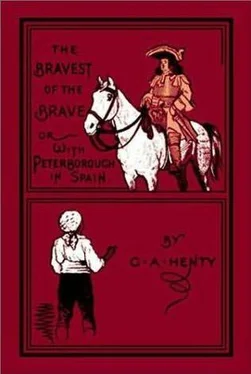The officers thoroughly agreed, and with the greatest coolness the captain gave his orders for the abandonment of the vessel. Although the French man of war had now opened fire, all the wounded, the whole of the crew, the flags, papers, and everything of value were placed in the boats, and the vessel was then set on fire in a dozen places.
After superintending everything personally, and making sure that the fire had obtained such a hold that it could not be extinguished, Captain Mordaunt ordered the officers to descend into the boats. Just as he was about to leave the deck himself, the last man on board the ship, a cannon shot from the French man of war struck him in the leg. The officers ran back and raised him from the deck.
"It might have been worse," he said cheerfully. "Now, gentlemen, will you carry me down and place me in my gig, and then take your boats as arranged? Be careful, as you row toward shore, to keep the Resolution between you and the Frenchman's guns."
Everything was done steadily and in order, and the survivors of the crew of the Resolution reached the shore without further loss. The Resolution was now in a blaze from end to end, and by eleven o'clock she was burned to the water's edge. Mordaunt and his crew were kindly received by the people of the country. As the captain himself would not be able to move for some time, Jack and Graham said adieu to him and posted to Turin, where the earl had told them that he should go direct from Leghorn.
They arrived before him, but twenty-four hours after they had reached the capital of Savoy the earl arrived. He had already heard rumors of the desperate fight between the Resolution and the enemy, and that his son had been wounded. His aides de camp were now able to assure him that, although serious, Captain Mordaunt's wounds were not likely to be fatal, and Peterborough was delighted with the narrative of the gallant achievement of his son. Shortly afterward an imperative order for his return reaching the earl, he set out for England through Germany with his two aides de camp. Peterborough was suffering from illness caused by the immense exertions he had made through the campaign, and traveled but slowly. He visited many of the German courts, and went for a few days to the camp of Charles of Sweden in Saxony.
After this, by special invitation, he journeyed to the camp of the Duke of Marlborough at Genappes, where he was received with much honor by the great commander. He presented to him his two aides de camp.
"They have, my lord duke," he said, "been my faithful friends throughout the whole campaign in Spain, they have shared all my dangers, and any credit I may have gained is due in no small degree to their zeal and activity. It is unlikely that I shall again command an army in the field, and therefore I would recommend them to you. They will accompany me to England, for they, too, need a rest, after their exertions; after that I trust that they may be sent out to fight under your orders, and I trust that you will keep them in your eye, and will give them the advantage of your protection and favor."
The duke promised to do so, and, after a few days' stay in the camp, the earl with his two followers started for England, where he arrived on the 20th of August, 1707, nearly two years to a day from the date when he had appeared, with a force under his command, before Barcelona. But the campaign itself, so far as he was concerned, had lasted less than a year, as it was in August, 1706, that he rode into Valencia, after having been deprived of his command.
In that year he exhibited military qualities which have never been surpassed. Daring to the point of extreme rashness where there was a possibility of success, he was prudent and cautious in the extreme when prudence was more necessary than daring. With absurdly insufficient means he all but conquered Spain for Charles of Austria, and would have succeeded in doing so altogether had he not, from first to last, been thwarted and hampered by jealousy, malignity, stupidity, and irresolution on the part of the king, his courtiers, and the generals who should have been the earl's assistants, but who were his rivals, detractors, and enemies.
It must be owned that Peterborough owed this opposition in some degree to himself. He was impatient of fools, and took no pains to conceal his contempt and dislike for those whose intellects were inferior to his own. His independence of spirit and eccentricity of manner set the formal German and Spanish advisers of the king against him, and although adored by the officers and men who served under him, he made almost every man of rank approaching his own who came in contact with him his personal enemy. Among the bulk of the Spanish people of the provinces in which he warred he was beloved as well as admired, and even to this day legends of the brilliant and indefatigable English general are still current among the people of Catalonia and Valencia. No man ever served the cause to which he devoted himself with greater zeal and sincerity. He was lavish of his own private means in its interest, and, even when his advice and opinion were most slighted, he was ready to sacrifice himself, his rank, and dignity to the good of the cause. Had he had the good fortune to command an army of his own countrymen unfettered by others, it is probable that he would have gained a renown equal to that of the greatest commanders the world has known.
The great services which he had rendered were warmly felt and acknowledged by the people of England on his return, and the attempts of his enemies to undermine his reputation were confuted by the papers which he brought back with him. For a time Peterborough took a considerable part in politics, and his acrimony in debate so enraged his enemies that his conduct during the war in Spain was called into question. A debate on the subject took place. In this he successfully defended himself from the attacks made against him, and a formal vote of thanks to him was passed.
Some years afterward he retired altogether from public life, and privately married Miss Anastasia Robinson, his first wife having died many years before. Miss Robinson was a singer of the highest repute, of the most amiable character, and kindest disposition. There was no reason why the match should not have been publicly acknowledged, as the lady was held in universal esteem; but, with his usual eccentricity, the earl insisted on the marriage being kept a secret, and did not announce it until on his death bed in the year 1735. Lady Peterborough lived in profound retirement, universally beloved and honored, to the age of eighty-eight.
Upon arriving in London Jack stayed for a few days with his friend Graham, whose family lived there. The earl had told the young officer that he would introduce them to the queen, but, on their calling by appointment on him at his hotel on the third day after their arrival in town, Peterborough said:
"You had best go about your own business for a time; the queen is out of temper. The ears of ministers have been poisoned by lying letters from my enemies in Spain, but it will all come right in time. As you know, I have papers which will clear me of every charge that their malignity may invent. When I am in favor again I will let you know, and will present you to the queen and minister of war; at any rate, you will like a rest at home before you set out for the Netherlands, so there will be plenty of time."
The next day Jack took his place on the coach for Southampton. He arrived there after fourteen hours' journey, and put up at a hotel for the night. The next morning he dressed himself with greater care than usual, and started for the well remembered shop in the High Street. He knocked at the private door, and inquired if Mistress Anthony were in.
"Will you say that a gentleman whom she knows wishes to speak to her?"
Читать дальше












